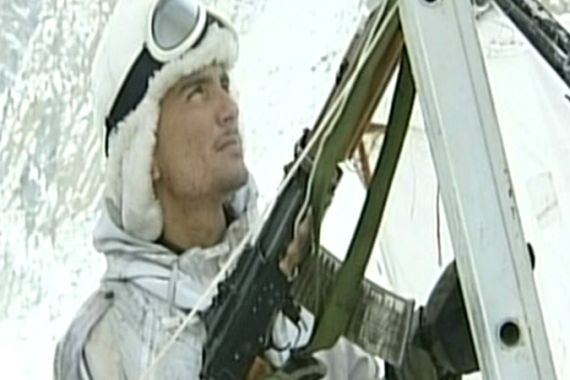Siachen search resumes for Pakistan soldiers
Military team aimed by sniff dogs hunt for more than 100 soldiers missing since avalanche hit Himalayan base.

The Pakistani military has resumed rescue operations to locate more than 100 soldiers missing since a massive avalanche hit their high-altitude base in the Himalayas.
A team of 150 soldiers aided by sniff dogs resumed their efforts on the Siachen Glacier on Sunday after the search had been called off the previous night because of darkness and poor weather.
Keep reading
list of 4 itemsBirth, death, escape: Three women’s struggle through Sudan’s war
Mapping Israel-Lebanon cross-border attacks
Nearly 55 million face hunger in West and Central Africa, UN warns
“No recovery has been made so far,” a military official told the AFP news agency, adding that heavy machinery had been sent in and the rescue effort was in full swing.
Al Jazeera’s Kamal Hyder, reporting from Islamabad, said army chief General Ashfaq Parvez Kayani had arrived at the site early on Sunday.
“We are told this morning that the military chief has already arrived at the area that was hit by the avalanche. He is there to supervise recovery of those bodies. Even though rescue operations continue, the hope is fading.”
The Pakistan military said in a statement on Saturday that at least 124 soldiers and 11 civilian contractors were missing after the avalanche engulfed the base in the northern tip of the divided Kashmir region earlier during the day.
The military also released the names of the missing in a statement.
Heavy machinery
The army has moved in heavy engineering machinery by air from the garrison town of Rawalpindi to aid in the operation.
 |
A team of doctors and paramedics has also been rushed to the region, which suffers extreme weather conditions, with temperatures on the Siachen glacier plummeting to as low as minus 70 degrees Celsius (minus 94F) during the winter.
“At six o’clock this morning this avalanche hit a [military] headquarters,” Major-General Athar Abbas, the Pakistan military spokesman, said on Saturday.
Speaking to Al Jazeera, Abbas said “it will take days to complete the rescue operations” due to the climate and the difficulty of terrain.
Despite describing the slide as “a massive scale avalanche”, Abbas said Pakistani forces remain hopeful.
“This is an extremely remote region, and it would be difficult to continue the rescue effort at night,” Al Jazeera’s Kamal Hyder reported from Islamabad.
He said that with more than 150 military outposts surrounding the glacier, the Pakistan and Indian sides face not only each other but “also face nature … [on] the highest battleground in the world”.
Difficult terrain
Shaukat Qadir, a former brigadier in the Pakistani army who has been to Siachen on numerous occasions, told Al Jazeera it was the biggest casualty of soldiers on the glacier known for its treacherous conditions.
“We have fantastic accommodation for the soldiers,” he said. “When you walk on this terrain you never know when it would come down, and certainly you cannot predict an avalanche.”
The Siachen glacier, on the tip of the Kashmir region that both Pakistan and India claim, is home to an estimated 15,000 soldiers from both countries.
Siachen, rising to 6,000 metres above sea level, has seen more soldiers die near the Karakoram base from weather-related incidents than gunfire since 1984.
“The fact of the matter is that 70 per cent of the people have died because of natural causes,” Qadir said, “and I think this is the time we ended this damn conflict, which has absolutely no explanation.
“I can just hope [President Asif Ali] Zardari talks about this with [Indian Prime Minister] Manmohan Singh [on his visit to India on April 8] and settles this issue for both, us and Indians.”